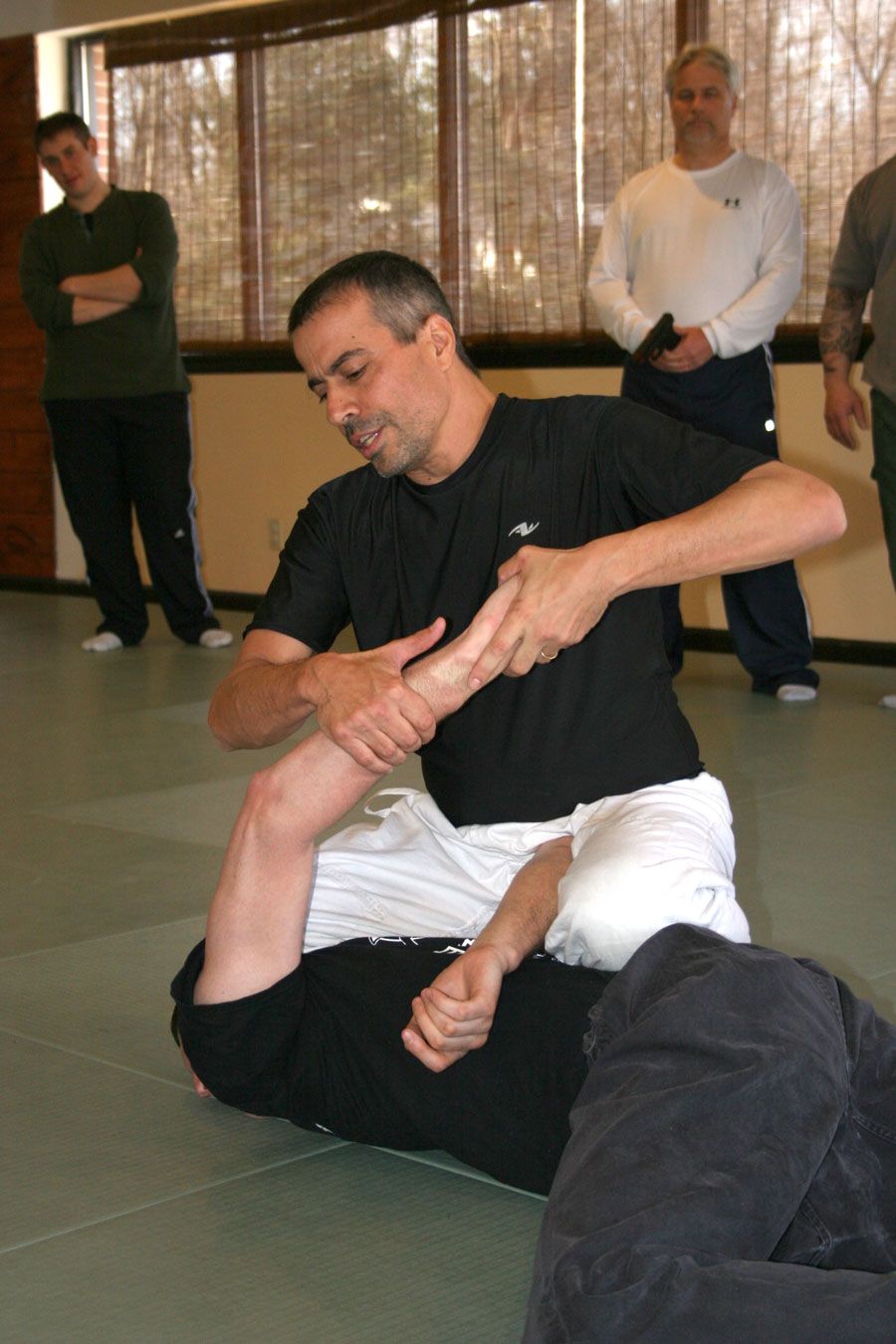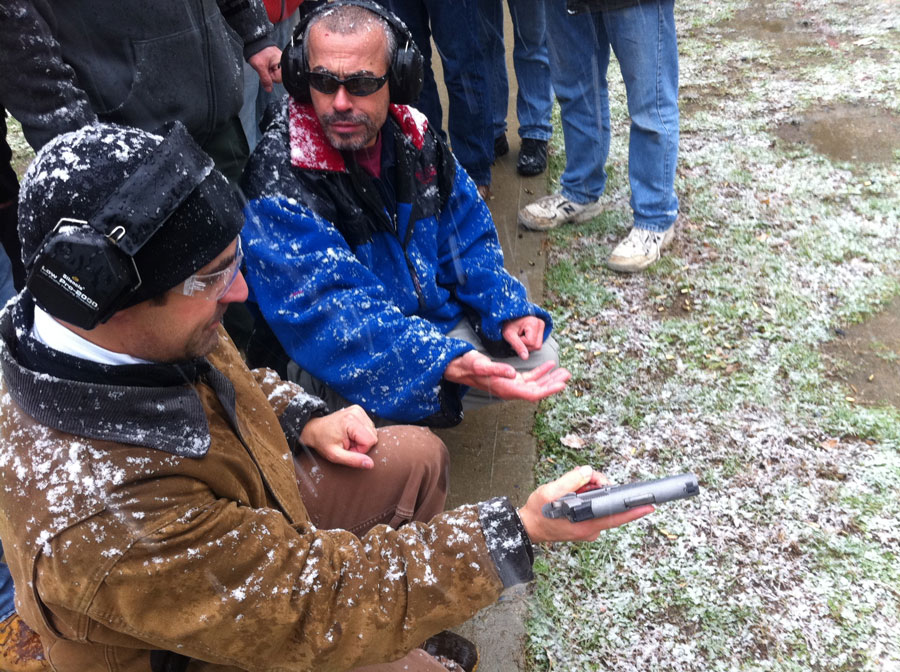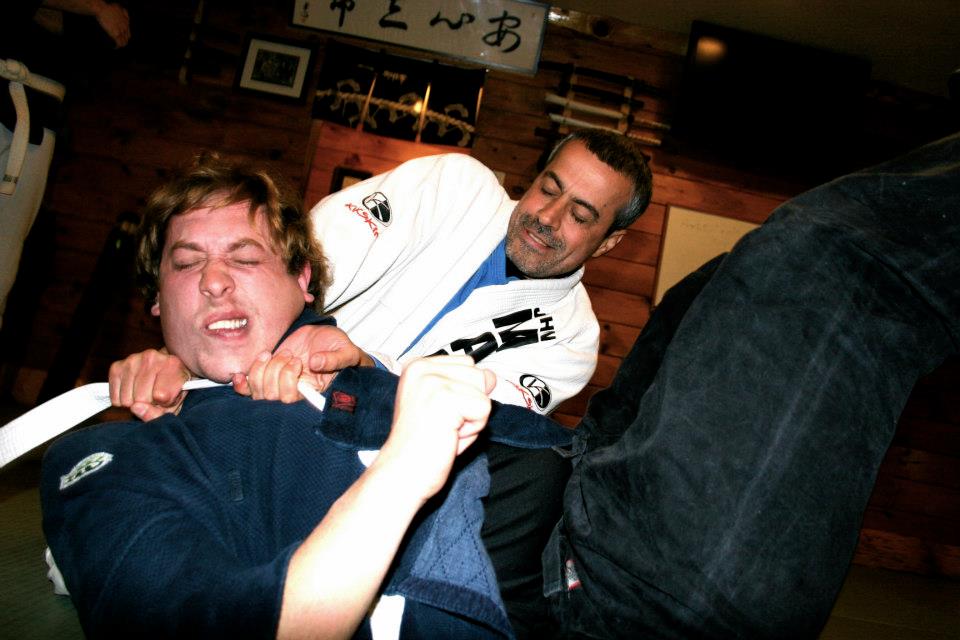Avi Nardia, The sword of Giving Life
Part 1: Going back to the roots of Israeli close quarter combat, his Dad and the roots of KAPAP
Adam: Today we are joined by someone who is extremely special to me. He is not only one of my teachers, one of my inspirations in the world of martial arts, but I have the honor and privilege to also call him a friend.
I am really excited and I could not speak more highly of this man as a warrior but also as a father, and it is really exciting for me that is going to be the kick off podcast, the kick off episode for Close-Quarter Dad, and I am excited to introduce all of you to my friend Avi Nardia sensei.
Avi, welcome to the podcast, Close-Quarter Dad.
Avi Nardia: Thank you very much. Thank you.
Adam: I would love you to share, and give a tribute to your dad because I know that is a huge part of the backstory of KAPAP.
As well as, there is quite a bit of history in Israel with the work that your father did.
So, I was wondering if you could take a few minutes and share with myself and our listeners a little about your dad and his history, and then I would like to move into how that influenced you to get to where you are now.
Avi Nardia: Well, my father lost his parents when he was eleven and he moved from Europe to Israel, actually, as a new immigrant.
The one thing that I most respect for him because we always have excuses why we do the wrong thing, but even he had all the reasons to go wrong way, he just worked very hard ... Honest man.
He never went into crime, into bad ways, and he actually grew up in Israel since he is eleven. At the age of eighteen, seven years after, he joined the army, and he joined the paratroopers, which was a very young unit that actually was marked with the unit 101.
The unit 101 was a very conflict unit. It was lead by Meir Har-Zion, rest in peace. A guy that was later prime minister named Ariel Sharon, rest in peace.
You know, it is hard to judge those units in today's scale, because some people will claim that they did the wrong thing. Some will even claim war crime, but when you kill people, that is called war.
It is very tough times for Israel and it is very bad times. Sometimes in this environment, life can be much more brutal and tough.

Adam: So, just for anybody who is listening who does not quite understand, could you take this back to that time when he was eighteen ... What was the political environment like?
What was the landscape of threat in Israel and what was he facing as a young man and as a teenager?
Avi Nardia: My father was a tough guy and not talk much but mostly I heard it from friends.
For example, one day my father [inaudible] on the border was Jordan and there was a lot of time, situations where it will come from Jordan across the border which is a river.
But you know, in the U.S. It was not considered even ... The most wide river it will be like three meters. So it was very easy to cross and that is the border. There were a lot of issues with terrorists at that time, one name was [removed] and will come from Jordan and one day when he tend to change with another other farmer, they do shit on, the guy was butchered. His neck was cut and his genitals were not in place.
There was a lot of brutal war.
It was also to scare the people from the terrorists. At that time, Ariel Sharon made the unit. You need to remember Israel exist only from 1948 and now we talk about the few years later.
Adam: Right.
Avi Nardia: You know it was a very wild place when terrorist group coming and they slit their people and sometimes you had to, for example, these marry his sister.
She tried to go with her boyfriend, and she was raped and murdered, and them they let him go and he revenge on that village.
So it was much more like a paramilitary than a para, you know like, people take the law into their hands.
And at that time, unit 101, which is the mother for Isreali special forces ... They took them out from called 101 and they called them now paratroopers 890 and my father joined at that time to the army.
So you talk about tough people, farmers, survivalists ... Everyone had his own personal story about losing parents, and family ... Coming to a new wild country was the Wild West in that time.
It is a war time.
My father did five wars and my father ... From the only people in Israel, which is very limited to carry red-winged paratrooper. Most people, no matter which unit, they do not have this kind of energy to kill the people shooting in the war.
It is a totally different generation.
It is a generation of farmers, people that work to build the country. Israel exists because of those people. They did not have easy lives.
Mostly, talking about people that sacrificed everything that they had to grow a generation, like my generation ... To give them education, to give them fair opportunities, to give them better safety.
So that is my father.
My father said military was a second family and I think that all his life he was sorry that he left the army because it was a family at that time for him. That is why I think he tried to push me into army life.
Since I was fourteen, I was growing up as a military cadet. My high school was the army. It was like army high school and I just wanted to come to the army and go home. I am not the army personality.
It is very strange because people know me as a major and I am a yes sir, no sir, man. Those guys tell me actually I am a very funny guy and I do not like to tell people what to do and I do not like people telling me what to do.
I am a very free spirit.
If you see my life, I am a traveller. I am a nomad. I travel all over the world. Every month, I cross four or five countries minimum and I teach.
So, I think my father passed me two things.
One was the nomad mentality. He also like to travel. The other one was to do what you need to do if you need to do.
Because I am a major, come from Israeli army, we teaching Krav Maga which is the system of the army. Finally I am here in America, so the business strategy they used to slander me all over. None of them served in the (Israeli) army.
When they finished slandering me, they also tried to slander my father and two weeks before he died, I asked him, "Can you tell me about your red wings?"
He said, "Look, I don't care. We did what we had to do and that's it. We didn't do it for medals, we didn't do it for anything except to survive. We did it because it was necessary. We didn't do it to write books. We were a different generation than the generation you see now. Everyone takes video, everyone does something and writes a book about it."
You know they were a totally different generation. They were humble. They did it not because they wanted to write a book or to use it for marketing. That's my father's generation.

Adam: That's an amazing ... I have heard a little about your father, and you have shared a couple things with me, but thanks for going that deep with us and sharing that story.
Avi Nardia: My father never told me much. It is like, all in funeral and things and then friends come tell you stories. From my father's point, it is like and episode and now you need a different episode.
Adam: What really interests me is when-and-how your passion for traditional martial arts.
While you were in military in Israel, how did that contrast came to be, and the value you found in traditional martial arts as a soldier; what was it that attracted you and your appeal to those traditional arts?
Avi Nardia: Well you know, back to my childhood ...
I think that since I popped up in the world I was already in an emergency, straddling for my life. By blood was poisoned, I got [inaudible] immediately.
Like when a baby is born and immediately is in the emergency. My mom says that she remembers me always with wires to my head, to my body, and for all those machines it was not fatal. I think this was the first thing that I understood as martial arts. It is awareness. It is the will to live and to be good.
That is why I always tell my students I am actually teaching you quality of life
... To respect life
... How to live life.
This all depends on follow up, but we do not teach only how to defense.
Many times they want me to defense disarming a knife and I say let me teach disarming a fork because most of you will die from overweight, from heart attack, so let me teach you about disarming forks and how to live a healthy life because the percentage that somebody will attack you with a knife and there is another guy that when you are on the ground, he is kicking you.
This is in the movies, this happens maybe to 00.1 percentage of all the people, for example, from all the people dying from car accidents.
Self defense is also how to drive properly, how to not get killed on the road. These take me again, like when I was a child, I was very sick and a part of it, I was always fighting because my little brother or my bigger brother who was one year older me. Since I remember being born it was a fight. I mean, for anything.
Lunch ... Fight.
Breakfast ... Fight.
My father worked very hard, my mom worked a lot in the house and very busy. So everything for us was sold hand to hand with me and my brother, even let alone changing channels on the T.V.
Everything was hand to hand and of course that left me to always trust the martial arts.
I start with different teachers that do not even ask me their names, but I really have very good memories in my mind because they were not experts for this or that, but they all study Judo, Jujitsu, and blend what we call today Krav Maga.
But they are all coming from ex-army this, ex-army that, and they just teach so that is my childhood.
Then I saw by coincidence, Judo, and I fell in love with Judo because suddenly I thought that leverage is very important
... Movement
... Timing
All the things that I saw in martial arts important.

At that time, also my father always refused it. He did not like the level of Israeli martial artist teacher at that time. He said that when boxing was popular, they teach boxing. When Judo is popular now all Judo. We always did MMA.
My father started to teach me what he started in the army and it was very hard. Today, I can respect it because spirit and to be tough is sometimes very important and that is why body condition and mental condition for me is very important in what I teach as a martial artist.
Because you can have the best technique and get lost in a fight because without spirit you will always give up.
I can see from my father, from these kind of people that teach me, and then start doing Judo, because they love Judo.
When I was young, I always looked at karate like it was weird. To me, Judo, with all those moves in the air, and then I look and they're on the floor and choking each other... this was good.
But then one friend of mine was very impressive when he hit me karate, I felt it and I could not breathe. I said, "Wow, that is nice karate. That is what I want to study."
So I moved in to study karate from Goju Ryu.
Later on, of course, in my life I met a genius in martial arts, Patrick McCarthy and I start study and follow his work.
Then I met in Japan also my teacher for swords.
When you mention Kendo, it is true I studied Kendo. I do Judo and Kenjutsu, and today I do not teach anymore Kendo, I call it swordmanship. I also blend European sword, I am also an Olympic style fencer.
So, for me, it is the art of blade.
It is anything with a blade, I want to know how to utilize it. Once you understand the concept and the mind, you can do anything. You can fight with a pencil, you can fight with a sword.
Swordmanship is very, very important in my martial arts.
I think swordmanship teaches you the first thing in martial arts is to move. Because if you do not move, if you do not move a fight, if you do not try to avoid the fight, to move from the fight, you have been cut.
It does not matter how strong you are, it is tough to teach you
... You do not want to get cut.
This is the risk that you have in any free fight. You fight with somebody in the gas station and the guy pulled a knife.
So, making a mentality of I do not really want to fight or at least I have to. This, I really appreciate what swordmanship teaches me. This is why, always when people ask me, I see myself as a swordmanship and combatant.
It does not matter if you do this style or that style, we talk about this stuff and the first is to avoid the fight.
The second is that you cannot avoid the fight then there is no matter if you have a sword or stick, that is a first distance that they can hurt you.
Or, next distance is when we going to grappling and now it is no matter if you train sambo, wrestling, sumo, jujutsu, Brazilian jiujistu; you will defend yourself by grappling now.
This is why lately I moved also the KAPAP Krav Maga into what I call Israeli jujitsu, because it's not Brazilian jiujitsu, it's not Japanese jujutsu.
Because of my past, I always respect the Japanese jujutsu and Judo, but I am always trying to study more and I am trying to see if I can get things from wrestling, from sambo, sumo. I do not care the name.
Everything but war is good for us.
Resources
Photo 1: Avi Nardia teaching KAPAP at Adam's Dojo, 2009. Photo: Adam Mitchell
Photo 2: Avi Nardia teaching tactical firearms, New York 2011. Photo: Adam Mitchell
Photo 3: Avi Nardia teaching Machado Brazilian Jiujitsu, Adam Dojo 2012. Photo: Adam Mitchell





